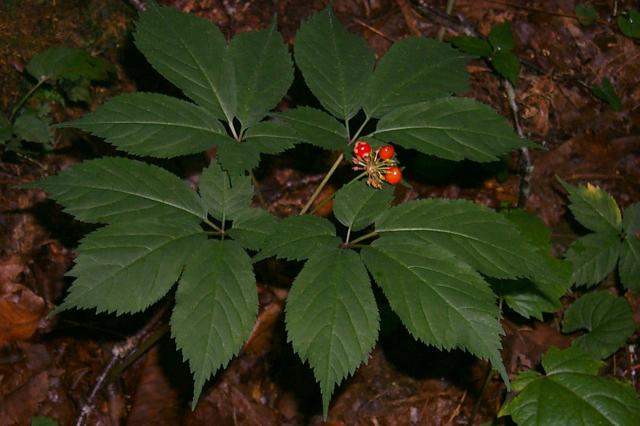The Blue Ridge Mountains are known the world over for the quality and diversity of their plant life, particularly ornamentals and medicinal herbs. Harvesting these treasures has been a fixture of life here for centuries, but assorted experts at the recent Southern Appalachian Man and the Biosphere Conference in Asheville said our forest products are being loved to death.
It all probably started sustainably enough: Native Americans were collecting small amounts of medicinal herbs well before white folk arrived. Shipping logs from the early 1770s show English ships arriving on these shores filled with tea and departing with their holds stocked with Blue Ridge ginseng. In the 1800s, Western North Carolina fur traders supplemented their income by collecting and selling medicinal plants. Today, local folks gather thousands of pounds of ramps each spring, and our soils nurture a million-dollar industry in medicinals. Plants such as ginseng, cohosh and goldenseal are used to treat common maladies ranging from hives to flu.
But at this year’s SAMAB Conference, scientists, agency officials and even dealers involved in collecting forest products said they’re concerned about current harvest levels.
North Carolina permits more botanical collection in its national forests than most other areas of the country, due in part to public interest in species such as ginseng and galax, notes agency botanist Gary Kauffman. Wild ginseng collection, in particular, appears to be escalating: In the past three years, the number of permits issued for harvesting wild roots on the state’s national forest lands has tripled. The highly prized medicinal has been used in China for thousands of years.
Collecting plant material is forbidden in national parks, but officials with the neighboring Great Smoky Mountains National Park say poaching in the Smokies has intensified as ginseng populations are depleted in surrounding areas. Four WNC men made news recently when they were sentenced to jail time for illegally collecting ginseng; in the past 10 years, park law enforcement has seized nearly 11,000 illegally harvested ginseng roots. Yet experts say only a small percentage of poachers are ever caught.
Poaching on private forest lands is equally voracious, noted Joe-Ann McCoy of the Bent Creek Institute. “You can’t keep your ginseng safe in WNC,” she said.
That begs the question: Can wild plants be sustainably collected? But while conference presenters attempted to address it, firm answers were in short supply. Few basic studies have been done, and unlike commercial tree species, herbaceous plants haven’t been analyzed to determine a sustainable annual yield.
The concern only grows when you consider these species’ reproductive biology, says Kauffman. Ginseng, for example, propagates only from seed, and plants don’t generally bear fruit till around age 13, when they display the characteristic three “prongs” of leaves. Fully mature, four-pronged plants, highly desired by collectors, may be 22 years old or more, and individual plants may remain productive for 50 to 60 years. So when collectors take them, they’re removing the most successful, locally adapted individuals (and their seed-making potential) from the population.
And as the region’s human population increases, so does the demand for these plants, though most WNC ginseng goes to feed the hungry Asian market. Wild ginseng is up to 25 times more valuable than cultivated plants, says Park Service biologist Nora Murdock, because the active ingredients are believed to be more concentrated in the wild plants’ tissues. In 2007, the price of wild ginseng hit a record high of $1,100 per pound; it’s now around half that. Still, there’s often a big jump in ginseng collection when the market price spikes, noted Tony Hayes, a ginseng buyer for the Boone-based Ridge Runner Trading Co. And that attracts people who know little about traditional collection practices.
“The best harvesters were trained by their grandparents,” he told the conference audience. “Take this, put this back, and there will always be some.” When it comes to preserving harvestable populations, Hayes maintained, “Education is the biggest thing.”
Galax may fare slightly better than the slow-growing ginseng, because collectors can pluck the leaves (which are used in floral arrangements, particularly during the holiday season), leaving the roots in the ground to sprout again. But some galax collectors, says Murdock, have been seen pulling up entire plants by the roots, decimating a local micropopulation. Ramps, too, are generally pulled up roots and all, and their populations have been markedly reduced across the region.
Meanwhile, all these agencies’ law-enforcement budgets are declining, and “Illegal poaching is far exceeding what we can deal with,” noted Kauffman. But don’t pin your hopes on cultivation either: “Cultivation won’t stop poaching,” proclaimed N.C. State horticulturist Jeanine Davis.
“If we want to ensure collecting, we have to ensure sustainability,” said Alix Cleveland of the Forest Service’s Special Forest Products program office in Atlanta. And given today’s increased harvest pressure, “That will mean active management.”
— Send your local environmental news and tips to sandrew@mountainx.com, or call 251-1333, ext. 153.




Before you comment
The comments section is here to provide a platform for civil dialogue on the issues we face together as a local community. Xpress is committed to offering this platform for all voices, but when the tone of the discussion gets nasty or strays off topic, we believe many people choose not to participate. Xpress editors are determined to moderate comments to ensure a constructive interchange is maintained. All comments judged not to be in keeping with the spirit of civil discourse will be removed and repeat violators will be banned. See here for our terms of service. Thank you for being part of this effort to promote respectful discussion.